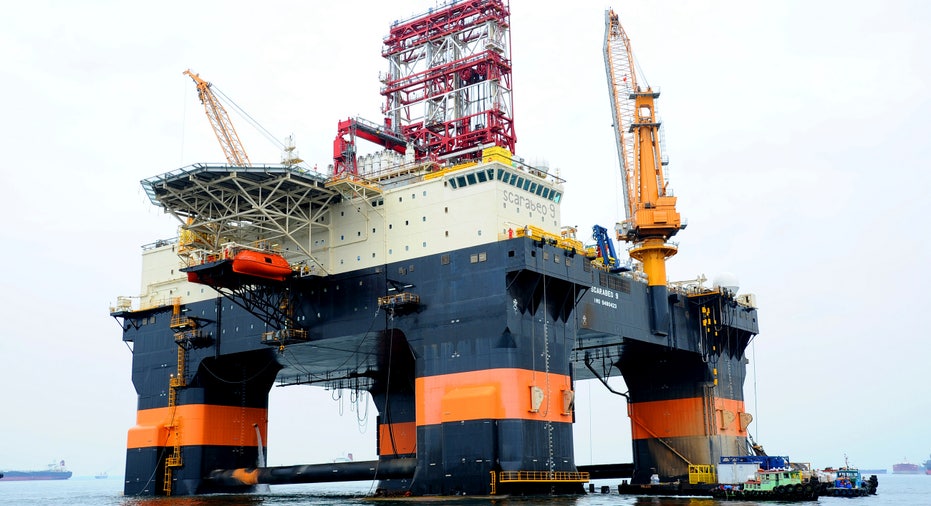Oil Climbs Amid Growing Iran Tension

Oil futures rose on Monday on growing tension between Saudi Arabia and Iran, after the Islamic state told its Gulf Arab neighbours not to make up any shortfall caused by an embargo on its crude oil exports.
Saudi Arabia, the world's top exporter, said on Monday that could lift its production by some 2 million barrels per day 'almost immediately'.
Brent crude futures traded 80 cents higher at $111.22 a barrel at 1538 GMT, after touching an intra-day high of $111.67. U.S. crude rose 65 cents to $99.35 a barrel, having traded as high as $99.80 earlier in the session.
The latest move from Iran comes as top Asian buyers of Iranian oil -- China, Japan and South Korea -- tour alternative Middle East suppliers while the United States pressures nations to stop importing oil from the Islamic Republic.
"Iran is the main topic still in the market with the new warnings against other Arab producers," said Andy Sommer, oil market analyst with EGL in Switzerland. "We have strong wordings from Iran in the last couple of days".
Saudi Arabia on Monday expressed doubts over Iran's claim it could block the main oil shipping route out of the Gulf and made clear it was ready to pump more oil after sanctions threatened to cut Iranian sales of crude.
The comments follow a warning from Tehran that any move to replace Iranian oil on the markets would "not be perceived as friendly," the country's OPEC governor told a daily newspaper.
Saudi Oil Minister Ali al-Naimi said in an interview with CNN on Monday the world's No. 1 oil exporter -- the only OPEC member with significant unused capacity -- could increase oil production by about 2 million bpd "almost immediately" from current levels, noting it wants oil prices to stabilise at around $100 a barrel.
"The Iranian situation has taken a new twist," said JBC Energy's David Wech in a note to clients. "While the focus had been on Europe ... it now appears that Asian buyers will be the first to give in to U.S.-led pressure and forego the purchase of Iranian crude.
"But this is a risky game as the region is the most import-dependent in the world, attracting over 16 million ."
Despite the strong support from geopolitical jitters, worries about the euro zone capped gains. A mass downgrade of nine euro zone countries on Friday brought into sharp relief the challenges faced by the region.
OPEC, in its latest monthly report, echoed the 'pessimism' about the region's economic prospects and cut its 2012 world oil demand growth forecast by 10,000 bpd to 1.06 million bpd.
In the United States, many markets were closed for the Martin Luther King, Jr. holiday.
EUROPEAN WOES
OPEC's cut came as pressure piles on Athens to reach a deal with private creditors to help it reduce its debt ahead of a repayment in March.
"You need to watch what will happen with the talks over the Greek debt because they broke down Friday. That could be more significant than the S&P downgrade," Olivier Jakob from Petromatrix said.
Concern over shipments from two key African exporters, Nigeria and Sudan, also lent support to prices.
Nigerian trade unions called of strikes after president Goodluck Jonathan announced a cut in petrol prices to 97 naira ($0.60) a litre on Monday, partially reversing the effects of an end to fuel subsidies which had more than doubled the pump price to 150 naira from 65 naira.
"Although the Nigerian strike has been called off ... there are still underlying issues with Iran which are keeping prices reasonably buoyant at the moment," said Tony Machacek of Jefferies Bache in London.
Sudan said on Sunday it had started confiscating some oil exports from South Sudan that it believes it is owed to meet unpaid transit fees.
Looking ahead to Tuesday, investors await Chinese data to gauge the outlook for growth in the world's second-largest oil consumer. According to a Reuters poll, China's economy is on track to slow for a fourth successive quarter as global demand slackened. (Additional reporting by Manash Goswami in Singapore; editing by Keiron Henderson)



















